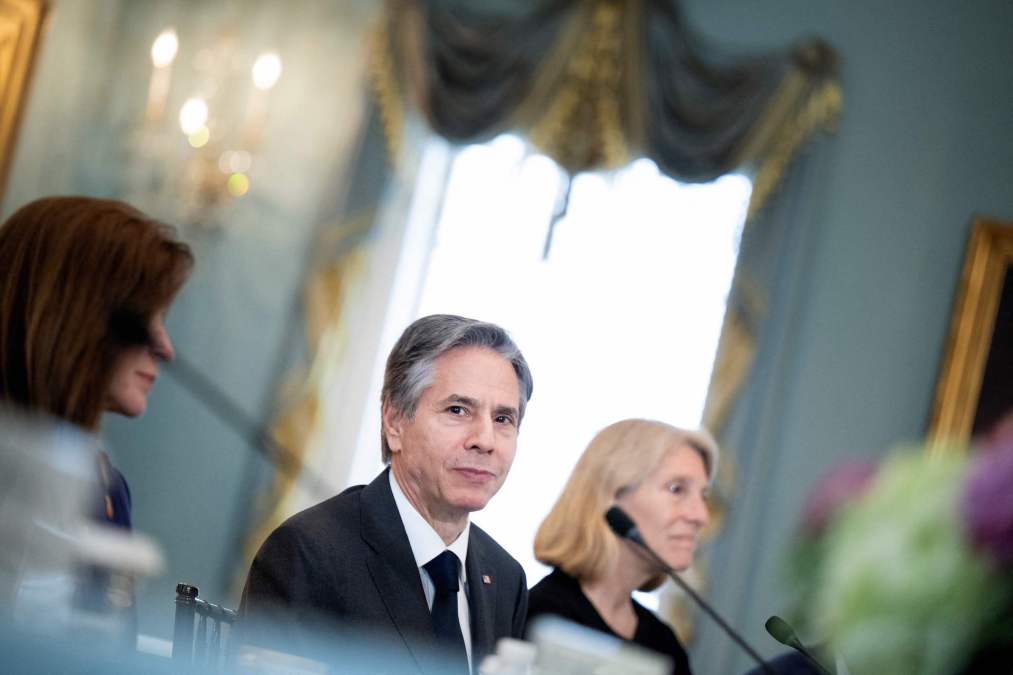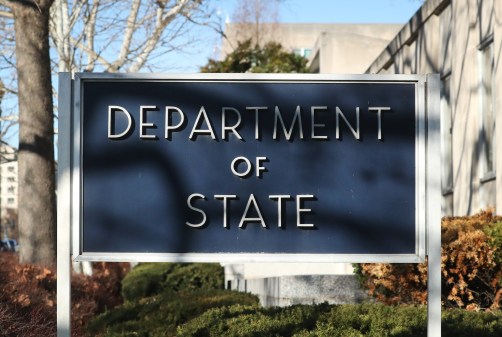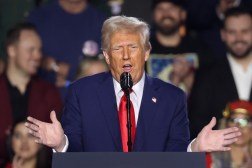Fick would bring much-needed energy jolt to State’s new cyber bureau, observers say

Andrew Exum, a longtime friend of freshly anointed State Department cyber ambassador Nate Fick, didn’t hold back when he learned that Fick was in line for the highly anticipated State Department Bureau of Cyberspace and Digital Policy ambassador-at-large job.
“I’ve traveled all over the world, from San Francisco to Singapore, and the only two things I have seen that have somehow lived up to all the hype that have preceded them are the Mask of Tutankhamun and Nate Fick,” tweeted Exum, a former senior Defense Department official, referring to an iconic golden mask that belonged to the eponymous Egyptian pharaoh.
Exum, now a consultant, said Fick will be perfect for the State role not primarily because he has ties to President Joe Biden, or that he has street cred with DOD as a Marine who completed two combat tours in Iraq and Afghanistan, but because he is a uniquely experienced leader with an enviable Rolodex populated with leaders serving throughout the executive branch.
“Nate has real friendships and relationships with some very senior officials across government, and that’s going to be really important for him and for the Department of State as it navigates the interagency conversation,” Exum said. “He has such close relationships with so many people working in this administration, in a variety of departments and agencies, that he’ll not only be an effective messenger for State Department equities, but he’ll also be an effective partner for people in other departments and agencies.”
Fick spent four years serving as the CEO of the national security think tank the Center for a New American Security, an elite organization with which several current Biden officials were formerly affiliated. He also serves on the board of the Council on Foreign Relations, which is heavily trafficked by former and current administration officials.
The State Department bureau will work to augment the Biden administration’s effort to provide digital aid to allies. It also will coordinate with international partners to manage threats and push American leadership to set global cyber standards, among other responsibilities. CyberScoop reported Wednesday that Fick was the administration’s selection for the ambassador post.
“He’s got a great reputation in the private sector, he’s shown himself to be a very good leader, both in the military and in the private sector.”
Chris inglis, national cyber director
White House National Cyber Director Chris Inglis, for one, is a Fick cheerleader. Inglis said he can’t confirm or deny that Fick is the pick because it is for the State Department to announce, but added that he has worked with Fick in various capacities in the past and thinks he is “terrific.”
“He’s got a great reputation in the private sector, he’s shown himself to be a very good leader, both in the military and in the private sector,” Inglis said in an interview with CyberScoop on Thursday.
A diplomat who can navigate interagency tensions
Asked about the role Fick, a celebrated combat veteran, might play in helping State improve its relationship with the Defense Department — which has recently been contentious as the White House pared back some DOD cyber ops authorities by bringing State back into the decision-making process — Inglis said that as both a leader in the Marine Corps and as a private sector CEO, Fick possesses uncommon diplomacy skills.
Fick, Inglis said, is “somebody who can use the art of diplomacy to reconcile great and diverse sets of interests.”
DOD cyber authorities have been in the news since Tuesday when Cyber Command leader Gen. Paul Nakasone disclosed in an interview with the British outlet Sky News that the command has conducted offensive cyber operations to support Ukraine in its battle to push back against Russia.
“We’ve conducted a series of operations across the full spectrum; offensive, defensive, [and] information operations,” Nakasone said in an interview with Sky News.
After the comments surfaced, White House press secretary Karine Jean-Pierre said the White House view is that the offensive cyber-operations do not violate a pledge Biden made not to attack Russia militarily unless the US or its allies are attacked.
Cybersecurity leaders abroad also celebrated the Fick pick. Ciaran Martin, who served as the first CEO of the National Cyber Security Centre in England, said that State’s new Cyberspace and Digital Policy ambassadorship is much needed.
“Most allies are likely to view this very positively,” Martin, who now teaches at Oxford and advises the cyber investment company Paladin, told CyberScoop by text. “They look to American leadership in global cyber discussions and there’s only so far that the operational agencies can go in this space. So, it’s hard to see many, if any, downsides in having someone senior in State with national security credibility who is close to the Administration in a role like this.”
Filling a void at State
For many years no one at State has had responsibility for the many aspects of the cyber portfolio encompassed by the new ambassadorship position, insiders say.
It is past time for the State Department to create the role Fick would enter, assuming there are no last minute, major hiccups in the vetting process, one former Five Eyes security official said. Toby Feakin, who was appointed Australia’s inaugural ambassador for cyber affairs and critical technology in 2017, is considered “the stalwart” the official said, but a number of other countries, including Russia, also have cyber ambassadors.
Kevin Sheives, who worked at State for nearly 15 years — most recently as a long-standing official on the China desk and as an adviser for the Global Engagement Center’s counter-disinformation work on China — said that Fick’s role will be critically important, but that because no one has owned the issue set so comprehensively prior to now, Fick could have a lot to grapple with.
“The ball was up in the air, it was an important ball, and no one either had the authority to catch it, or the capacity really to do it well,” said Sheives, who left State in 2020 and is now associate director at the International Forum for Democratic Studies at the National Endowment for Democracy. “Even when there was a political imperative to engage with some of these international organizations and put forward strong candidates and strong campaigns … people didn’t quite have the resources and structure to execute them.”
While some close to the Defense Department suggested Fick would not play much of a role in directing State’s input on the cyber operations decisions which are governed by the newly revised National Security Presidential Memorandum-13, Christopher Painter, who previously held the role of cyber coordinator at State, disagreed.
Painter, who was the most senior person in the department working on cyber issues during his tenure, said that he regularly worked with the DOD on cyber operations and believes that Fick’s celebrated military background can only help him in such a role.
Political connections could help
Painter said Fick’s ties to Biden, who he campaigned for in 2008 and delivered a keynote speech for when Biden was the nominee for vice president at the Democratic National Convention, will also be valuable.
Fick’s political connections could bolster his success in working with other major agencies involved in cyber issues like DOD, the Department of Homeland Security and the Department of Justice, Painter said.
Painter said the most important factor determining Fick’s success will be the backing he gets from within State. Painter said he has spoken with both Secretary Antony Blinken and Deputy Secretary of State Wendy Sherman about the job, and he knows they have spent many hours thinking about the role, which underscores how closely they will likely manage and support Fick.
That support will be crucial, Painter said, because “there’s lots of bureaucracy.”
Fick lacks experience at the State Department and in diplomatic circles, which Painter said may be difficult for him at least initially.
“He brings certain attributes to the table, but it’s going to be a learning curve,” Painter said. “It’s a different culture.”
Some say Fick’s outsider status is just what is needed to shake things up at State.
“It is very good that he has private sector cyber experience, as a lot of the new Bureau’s challenges will center around how the State Department works with the private sector on international standards setting and digital economy efforts,” said Mark Montgomery, the former executive director of the Cyberspace Solarium Commission and the senior director of the Center on Cyber and Technology Innovation at the Foundation for the Future of Democracies.
Montgomery, who served as policy director for the Senate Armed Services Committee under former Sen. John McCain, said Fick’s military history is just the shot in the arm State needs.
“His Marine leadership experience will come in handy as he deals with State Department bureaucracy,” Montgomery added in comments he sent by email.






